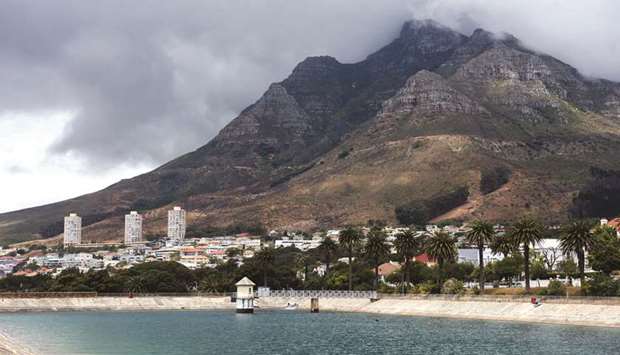As Cape Town’s dam levels fall, the city may see borrowing costs rising.
The water crisis afflicting Africa’s top tourist destination is credit-negative as it will reduce revenue at a time when the city has to boost spending to ensure supplies, Moody’s Investors Service said in a report yesterday. The report doesn’t constitute a rating action, said Moody’s, which has an investment-level rating on Cape Town’s bonds.
Municipal water revenue contributed about 10% of Cape Town’s operating income in 2017, a proportion that is set to dwindle as the city restricts water usage. At the same time, spending on crisis management and water supply projects will increase, Moody’s Associate Analyst Daniel Mazibuko said in the report. Two main industries – tourism and agriculture – will feel the effect, leading to lower employment and tax income, he said.
“Other effects include threats to public health from poor sanitation and, more generally, to social order, which is significant given Cape Town’s marked income inequality,” Mazibuko wrote. “If the crisis persists, it remains to be seen how the city will cope with the unfolding crisis’ potentially wide-ranging consequences on the city’s finances and economy.”
Cape Town is in the throes of the worst drought on record, and water levels in its six main supply dams have plummeted to an average of 27.2%, from more than 90% four years ago. With the winter rainy season still about four months away, residents may find themselves lining up for a daily allocation of 25 litres (6.6 gallons) each from April 12 unless water usage declines sharply.
The city last accessed the bond market in July, when it sold 1bn rand ($84mn) of sinkable securities maturing in 2027. It has a total of 5.2bn rand outstanding in four bonds, according to data compiled by Bloomberg. Moody’s rates the debt Baa3, the lowest investment level and on par with South Africa’s sovereign rating.
Cape Town’s policy of maintaining a strong liquidity ratio and conservative debt management, with a debt burden of only 11% of operating revenue, will help mitigate the effects of borrowing required to implement capital projects over the next three years, Mazibuko said.
A view of the Molteno reservoir as Table mountain stands beyond in Cape Town, South Africa on November 13, 2017. Cape Town has tightened water usage
restrictions, banning the use of potable water to irrigate gardens, wash cars or top up swimming pools, as it confronts its worst drought on record and a delay to the onset of the winter rainy season.

CAPE
